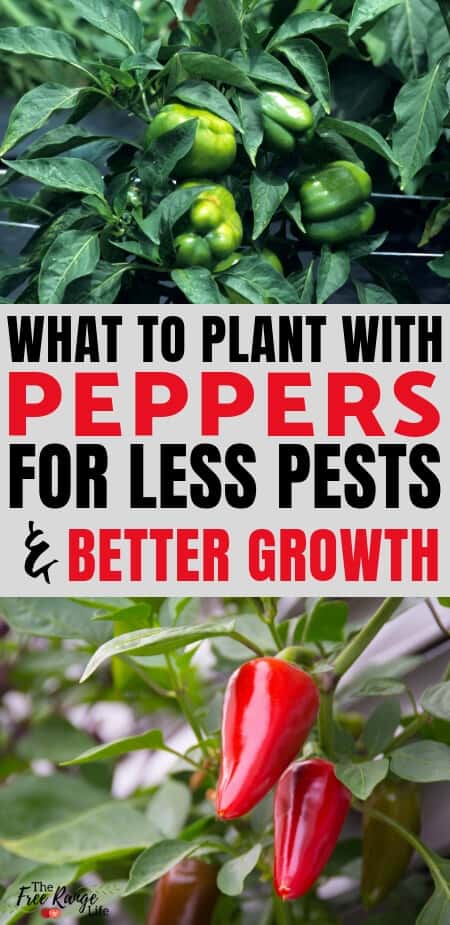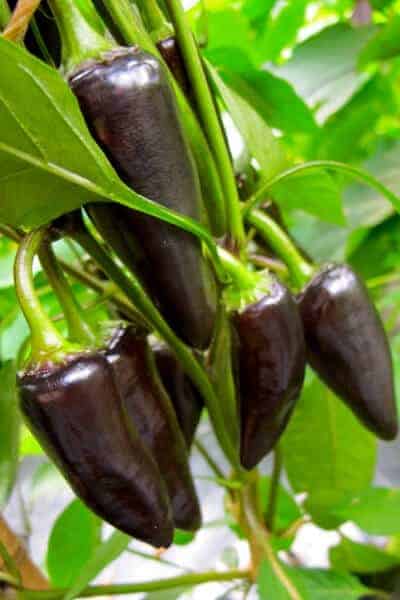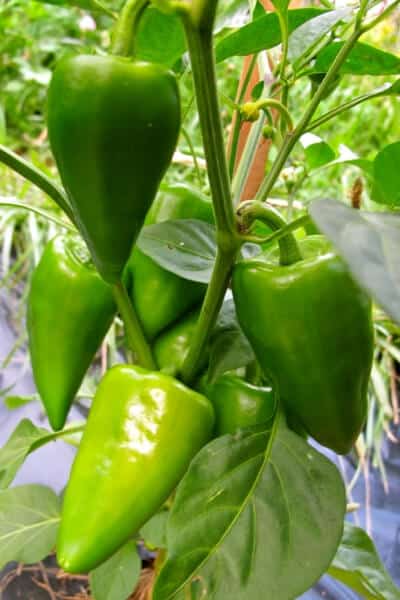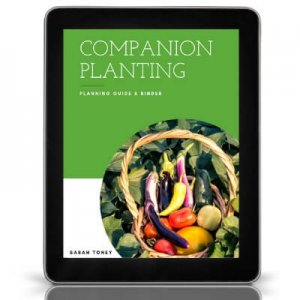In this article: Learn which are the best companion plants for peppers to improve flavor, growth, and deter pests!
Companion planting with your peppers can help your plants grow better, taste better, and have less problems with pests. So how does companion planting work? What can you grow with your peppers in your vegetable garden and what should be kept far away?
This site contains affiliate links. If you make a purchase using one of these links, I may earn a commission. Please see my disclosure page for more information about cookies collected and our privacy policy.
First off, peppers are a member of the nightshade family. Other members of the nightshade family include tomatoes, potatoes, and eggplant.
Below you will find a list of pepper companion plants that you can grow alongside your pepper plants to prevent pests and disease. Plus a list of what you should keep separate from your pepper bed.
If you are just getting started growing peppers check out my Guide to Growing Peppers and here are some of my favorite sweet pepper varieties. You can also learn how many peppers to expect from each plant– and how to ensure maximum yield.
Pick up a copy of my Companion Planting Guide and Binder to help you design the perfect garden beds with companion planting in mind. Everything you need to know about companion planting in an easy to read format so you can start companion planting sooner!
Good Companion Plants For Sweet Peppers & Hot Peppers
Companion planting is a great way to save space in the garden and improve the over health and harvest in your garden.
Companion planting can help you fit more plant into a small space, improve the soil conditions, and even improve the flavor of the peppers!
Here are some of the best plants to add to your pepper patch for the best results:
Peas: Peas are a great companion for peppers. Peas and peppers do not compete for nitrogen or other nutrients in the soil. Peas will actually fix nitrogen in the soil, making it more readily available for peppers.
Because peas are a cool weather crop and peppers prefer hot temperatures, it’s best to plant peas in the area first and then plant your pepper plants around them. The pea plants can be cut off above the soil after their season is over, making room for the peppers to take over the same space.
Basil: Basil plants are excellent companions to many night shades. It is said to boost the flavor of your peppers.
Basil will also help repel some insect pests that are bothersome to peppers such as aphids, spider mites, and thrips.
Eggplant : Eggplant and peppers are in the same family so they have all of the same needs making them good companions. If you are growing nightshades in the same garden bed together be sure to rotate your beds from year to year to prevent more disease and pest problems.
Carrots: Carrots and peppers grow well together. The carrots add some weed control and also help create the humid growing conditions peppers like.
The peppers also help keep the carrots sweet and give them shade! If you allow the carrots to flower, they can help draw in the beneficial lacewing.
Lettuce and Spinach: Lettuce and spinach make great companion plants for peppers because they don’t compete for the same nutrients. They also act as kind of a living mulch and reduce weeds around your pepper plants.
These greens are also mutually beneficial- giving more humidity to the peppers and receiving shade from the larger pepper plants.
Tomatoes: Again, because they are in the same crop family, tomatoes also make a great pepper companion plant. But do make sure your tomato plants don’t shade the pepper plants too much, so take care when planning your garden beds!
Annual Flowers and Flowering Herbs: Planting large flowering herbs or annuals will bring in more pollinators which will help your pepper plants produce more peppers per plant. These include flowers like cosmos, zinnias, calendula, and cone flowers.
Related Reading: The Best Essential Oils for the Garden
Pepper Companion Plants for Pest Control
French Marigolds: Marigolds show up in almost all companion planting lists, and for good reason. They are great at repelling squash bugs, soil nematodes, potato bugs, and more. I recommend planting marigolds throughout your garden beds.
Parsley: Parsley is a great herb companion plant for your peppers. It will attract predatory wasps (and other beneficial insects) that help control aphids in your garden. Let the parsley flower for the biggest benefits.
Nasturtium: Nasturtium is another flower that lands on many companion planting lists. It’s benefits include deterring aphids, squash bugs, potato bugs, and whiteflies. Plus you can add the blossoms to your salads along with the peppers!
Garlic: Garlic is a great pest control companion for peppers. It can help with aphids, beetles, and spider mites.
Dill: Dill, like parsley, will attract pollinators and deter pests such as the spider mites that can destroy your pepper plants.
Geraniums: Geraniums are a great trap crop for Japanese beetles. The beetles will be paralyzed after eating the leaves of geraniums, giving you a chance to pick them off easily. Geraniums also repel cabbage worms.
Hot Cherry Peppers: If you have problems with pepper maggots in your garden, try planting hot cherry peppers as a trap crop. The pest will prefer the cherry peppers over the rest of your pepper plants.
If flea beetles are your problem, I suggest using diatomaceous earth to keep them in check. Dust your plants while they are small, up until they begin to flower. Once your peppers have flowered your pepper plants should be strong enough to fight flea beetle on their own.
What Not to Plant with Peppers
Not all plants are created equal and some plants should be planted in different areas of the garden to ensure the best flavor, harvest and health of the plants. Here are some of the worst companion plants for peppers:
Beans (mostly hot peppers): Sweet and bell peppers don’t mind green beans, but hot peppers especially should be kept away from all types of beans, including pole beans and bush beans.
Fennel: Not much likes to grow near fennel, and peppers are no different. Keep this one in a separate bed.
All Brassicas: Peppers do not like being planted near brassicas. This includes broccoli, cauliflower, kale, brussels sprouts, and any others in this plant family.
Potatoes: Although peppers grow well with other nightshades, such as tomatoes and eggplant, they should be kept away from potatoes. This prevents the spread of disease in your garden. Also be sure to keep at least 2 years between planting pepper and potatoes in the same bed when you plan your crop rotation schedule.
Other Pepper Companion Planting Ideas to Try
Use white clover as a living mulch around your pepper plants. Clover can be planted as a permanent living mulch in the garden that will reduce weeds and provide nitrogen to the surrounding plants.
If you let it flower it will bring in pollinators as well. Be sure to choose a low growing variety and mow or trim it as needed so that it doesn’t compete with your plants.
Plant sweet alyssum under your peppers. This low-growing herb is full of small blossoms that will draw in a ton of beneficial insects such as parasitic wasps, tachinid flies, lady bugs, lacewings and more. These beneficial insects will help with all sorts of pests that may bother your peppers such as aphids, whiteflies, tomato worms, and other fruit worms. Plus it’s beautiful!
Once you have harvested your peppers, check out some of the following articles to learn how to store, use, and preserve your harvest!
9 Ways to Preserve Peppers at Home
Check out my other companion planting guides:
Best Companion Plants for Eggplant
Best Cucumber Companion Plants
Best Companion Plants for Squash
16 Ways to Use Companion Planting to Control Pests Naturally







Wish you offered print versions of your garden info,including companion planting,for those like me who don’t have a way to download things.